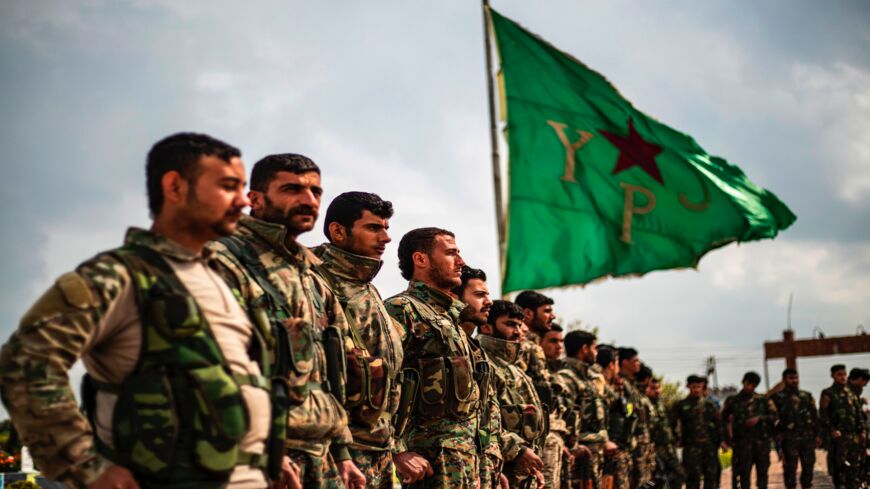Alwaght- Tehran summit on Syrian crisis held by the president's of Iran, Russia, and Turkey ended with a statement on Tuesday. The 15-point statement stressed the continuation of tripartite cooperation in Syria.
Meanwhile, Syrian Kurds were actors that followed the meeting with special sensitivity. In recent months, the Syrian Kurds felt a shadow of threat on their areas of control as Turkey said it planned a new campaign against them in northern Syria.
Since 2016, Turkish army launched Operations Euphrates Shield and Olive Branch, seizing around 4,000 kilometers of the Syrian territories including the important cities of Azaz, Afrin, Al-Bab, and Jarabulus.
From October 9 to November 25, 2019, Turkey launched an offensive, codenamed Operation Peace Spring, to push back the US-backed Kurdish-majority Syrian Democratic Forces (SDF) from Hasakah and Raqqa border areas, taking control of more areas held by the Kurds.
Recently, the Turkish President Recep Tayyip Erdogan traveled to Tehran to persuade Russia and Iran as two staunch allies of Syria to allow a new anti-Kurdish operation as he at the same time finds the way paved from the Western side amid Ukraine crisis and US and its allies' need for Ankara in NATO for confrontation of Russia.
In the meantime, the stated results of the consultations of the presidents of the three countries brokering the Astana peace process contain mixed messages for the Syrian Kurds, which will affect their situation in the future developments.
Although Tehran summit statement opposed "undermining Syrian national sovereignty" and "cross-border incursions", the major source of the Kurdish concerns is possible Russian flexibility to the Turkish demands in return of Ankara's non-conformity to the anti-Russian sanctions of the West, especially that the Syrian Kurds' closeness to the US is unacceptable to Moscow interests amid growing West-East confrontation.
Certainly, Turkey intends to shape the authorization for new round of its operations in northern Syria on Tehran summit's emphasis on "fighting terrorism in all its forms." Ankara recognizes Syrian Kurdish militias as the branches of its archenemy Kurdistan Democratic Party (PKK). One article of the statement stresses that the three countries emphasize on their determination to cooperate to obliterate all terrorist figures, groups, factions, and entities.
In Tehran, Erdogan described the Syrian Kurds "terrorists" and asserted that it should be clear to all that there is no place for separatist terrorist movements and their allies.
"We will soon resume out fight against terrorist organizations," he went on.
These Erdogan remarks after the statement come while one article of the statement, rejecting any "illegitimate separatist initiatives and threats against neighboring countries' national security", seems to have shown an understanding of the Turkish security concerns about northern Syria developments.
However, Tehran statement's emphasis on "the need for a peaceful solution to the Syrian crisis" and "non-viability of a military solution", generally criticizes Ankara's bellicose plans to escalate the Syrian crisis.
In such a situation of semi-suspension, it should be said that despite the fact that one of the main goals of Tehran summit was restriction of military conflict and prevention of a new war in the region and because Moscow is not willing to see a new front challenging its forces amid Ukraine war, the summit's results were pleasing to the Syrian Kurds.
Security guarantee tied to cooperation with Damascus
The developments in Ukraine and the flexibility of the West, especially Washington, in the face of Turkey's new plans for military adventure in northern Syria once again proved that the Americans are not a reliable ally to protect the Syrian Kurds from the occasional threats of the powerful northern neighbor. While the White House has strengthened its military presence in the oil-rich areas in the northeast of Syria in recent months, the experience of the past years teaches that one should not count on American promises of support, especially that with the end of the fight against terrorism, Damascus and its allies are focusing on regaining control of oil-rich areas and challenging the illegitimate and aggressive foreign presence in Syria. On the other hand, Tehran meeting's clear opposition to any separatist plans under the title of autonomy shows that betting on Washington's promises is betting on a wrong horse.
While all roads for Syrian Kurds lead to Damascus, news reports suggested that the Kurds and central Syrian governments held talks with a Russian mediation on military coordination and defense plans to push back against Turkish forces should Ankara decides to launch a new offensive in Kobani, Manbij, and Ain Issa.
According to Al-Mayadeen news network, a Russian delegation landed at Qamihli airport in Hasakah province on Tuesday for talks with SDF and implementation of agreements with Syrian army.
Syrian Arab News Agency (SANA) reported deployment of Syrian army forces in Ain Issa in northern Hasakah and Manbij and Kobani in eastern Aleppo. The Syrian army continues to reinforce its positions in northern and northeastern Aleppo outskirts, Al-Watan news website reported. Its report further said that recently reinforcements were deployed to Manbij outskirts as part of plans to block routes from all fronts to counter any incursion into Tall Rifat and Manbij. The Syrian forces set up military posts on borderlines with Turkish-backed Syrian National Army terrorist group, reported Al-Mayadeen.



























